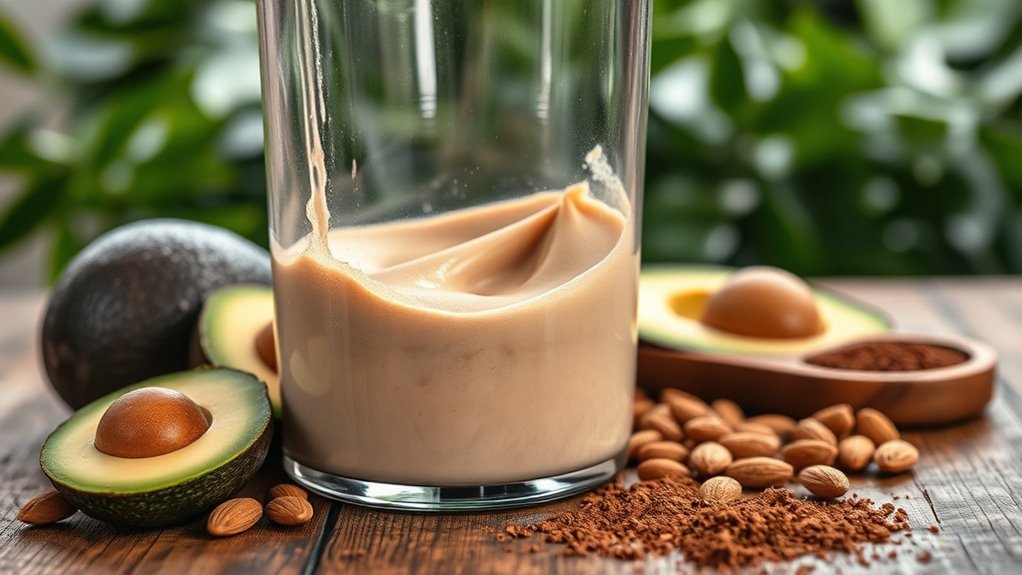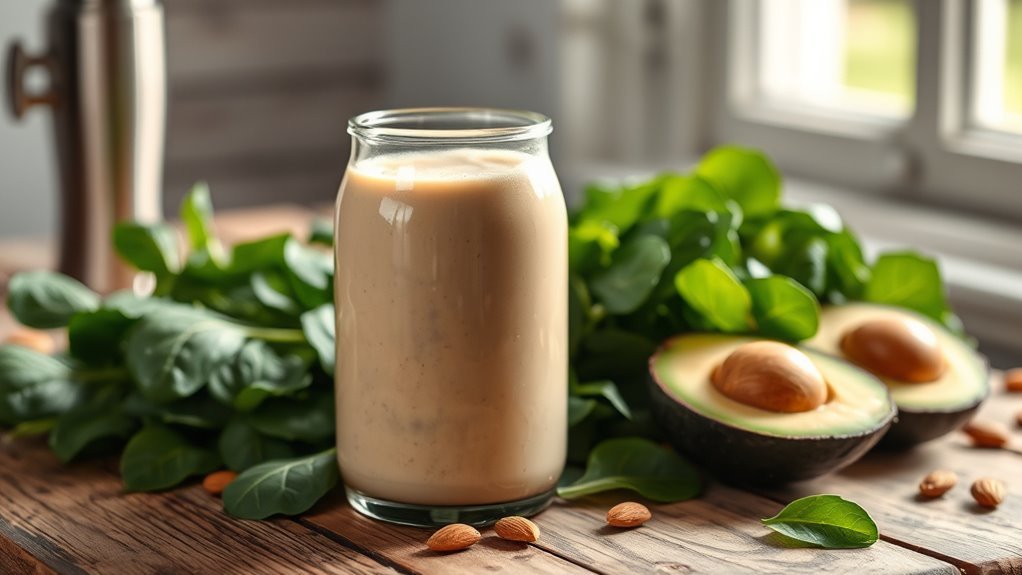Yes, whey protein can fit into your keto diet. It’s a low-carb, high-quality protein that supports muscle recovery while aligning with the macronutrient ratios needed for ketosis. Opt for whey protein isolate to minimize carb intake, as it typically contains less than 1 gram of carbs per serving. While it offers numerous benefits, some may experience digestive issues. If you want to understand how to incorporate it effectively, there’s more to discover about its role and alternatives.
Understanding the Keto Diet

Understanding the Keto Diet involves grasping its core principles, which typically emphasize a low-carb, high-fat eating pattern. To thrive on this diet, you’ll need to focus on your macronutrient balance, often aiming for about 70% fats, 25% protein, and only 5% carbohydrates. This shift can help your body enter a state of ketosis, where it burns fat for fuel instead of carbs. However, it also brings dietary restrictions that may limit certain food groups, making meal planning essential. While this diet offers freedom from sugar and processed foods, it requires commitment to maintain the desired macronutrient ratios. Ultimately, understanding these principles can empower you to make informed choices and enjoy the benefits of the Keto lifestyle. Additionally, recognizing the importance of ketosis can enhance your ability to stick to the diet and reap its benefits.
What Is Whey Protein?

Whey protein, a popular dietary supplement derived from milk during cheese production, is known for its high-quality protein content and rapid absorption. It’s an excellent choice for those looking to enhance their nutrition. Here are some key points about whey protein sources and benefits:
- Supports muscle growth and recovery
- Boosts metabolism and promotes fat loss
- Enhances immune function
- Provides essential amino acids
- Convenient and easy to incorporate into your diet
Additionally, incorporating whey protein into a keto diet can help maintain muscle mass while promoting fat loss. Whether you’re a fitness enthusiast or just looking to improve your overall health, whey protein can be a valuable addition. With its various forms, including whey isolate, concentrate, and hydrolysate, you’ve got options to fit your lifestyle. Embrace the freedom to choose what fuels your body!
Nutritional Profile of Whey Protein

When considering whey protein, it’s important to understand its nutritional profile. Typically, you’ll find that whey protein is high in protein content while being low in carbohydrates and fats, making it a popular choice for those on various diets. This balance can help you meet your dietary goals, whether you’re focusing on muscle gain or weight management.
Protein Content Overview
Protein plays an essential role in any diet, especially for those following a keto regimen. Whey protein is a fantastic option among various protein sources, offering a rich profile of essential amino acids. When you choose whey, you’re not just getting protein; you’re fueling your body with powerful nutrients. Here’s what makes it stand out:
- High biological value, meaning it’s efficiently absorbed.
- Complete amino acid profile, essential for muscle recovery.
- Low in lactose, suitable for many diets.
- Supports weight maintenance and muscle growth.
- Convenient and versatile for shakes or recipes.
Incorporating whey protein can enhance your keto journey, providing the freedom to meet your nutritional goals while enjoying delicious options. Additionally, it’s important to monitor protein intake to ensure you stay within the target ranges for optimal ketosis.
Carbohydrate and Fat Levels
While considering the nutritional profile of whey protein, it is essential to examine its carbohydrate and fat levels, especially for those adhering to a keto diet. Whey protein typically contains low carbohydrate levels, often around 1-3 grams per serving, making it a suitable choice for your keto lifestyle. This low carbohydrate content means you can avoid unwanted carbohydrate sources that could disrupt your ketosis. Additionally, whey protein is low in fat, generally having about 1-2 grams per serving, which helps you stick to your fat intake goals. If you’re looking for fat substitutes in your diet, whey protein can complement high-fat foods, providing a balanced approach to nutrition. Overall, it’s a versatile option for those seeking to maintain ketosis, as it offers low carb options that align with ketogenic dietary goals.
Carb Content in Whey Protein
When considering whey protein for a keto diet, it’s crucial to look at the carb content across different types. Isolate whey protein typically has lower carbohydrates compared to concentrate forms, making it a better fit for your ketogenic goals. By comparing these options, you can make an informed choice that aligns with your dietary needs. Additionally, selecting protein powders that are low in carbohydrates ensures you remain within your daily carb limits for effective ketosis.
Whey Protein Types
Understanding the different types of whey protein can greatly impact your nutritional choices, especially if you’re following a ketogenic diet. Each whey protein type has unique characteristics that can influence your carb intake and overall health goals. Here’s a quick look at them:
- Whey Protein Concentrate: Contains more fats and carbs, offering a richer flavor.
- Whey Protein Isolate: Lower in carbs, making it a popular choice for keto enthusiasts.
- Whey Protein Hydrolysate: Pre-digested for easier absorption, often with minimal carbs.
- Native Whey Protein: Less processed, retaining more nutrients and typically lower in carbs.
- Blends: A mix of various whey protein types, allowing for balanced nutrition.
Choosing the right whey protein type helps you stay aligned with your keto lifestyle while enjoying delicious protein sources. It’s also important to monitor carbohydrate content in your protein options to ensure you remain within your daily limits.
Carb Count Comparison
Each type of whey protein varies considerably in its carbohydrate content, which can affect how well it fits into your keto diet. For instance, whey protein isolate typically contains less than 1 gram of carbs per serving, making it an excellent option for those looking to minimize carb sources. In contrast, whey protein concentrate can have up to 5 grams of carbs, which might not align with strict keto goals. When selecting a protein powder, consider how it complements your overall meal plan, especially if you’re using it as a keto snack. Always check the nutrition label to verify you’re not exceeding your daily carb limit. With careful choices, whey protein can be a valuable addition to your low-carb lifestyle, especially when paired with healthy fats to enhance nutrient absorption.
Benefits of Whey Protein on a Keto Diet
Although you might think protein is just for muscle building, incorporating whey protein into a keto diet offers several benefits that go beyond simple nutrition. Here’s how it can enhance your experience:
- Supports muscle recovery after workouts, helping you bounce back faster.
- Aids in weight management, making it easier to maintain a healthy body composition.
- Boosts satiety, reducing cravings and keeping you fuller longer.
- Promotes overall health, providing essential amino acids your body needs.
- Enhances workout performance, allowing you to push harder and achieve your fitness goals.
Whey protein isn’t just a supplement; it’s a versatile tool that empowers you on your keto journey, providing both nutritional value and freedom in your dietary choices.
Potential Concerns With Whey Protein
While whey protein can be beneficial on a keto diet, it’s important to contemplate potential concerns that may arise. Some individuals experience side effects, particularly digestive issues like bloating or gas, especially if they’re lactose intolerant. If you fall into this category, choosing a whey isolate may help, as it contains less lactose. Additionally, consider the sourcing of your protein; not all whey is created equal. Quality concerns can arise from additives or low-grade ingredients, which can jeopardize your health goals. Ingredient transparency is vital, so always check labels to know what you’re consuming. Ultimately, being informed about these potential concerns allows you to make better choices for your keto journey. Moreover, understanding sunflower oil’s properties can aid in making informed culinary choices when integrating whey protein into your diet.
How to Incorporate Whey Protein Into a Keto Diet
Finding ways to effectively incorporate whey protein into your keto diet can enhance your nutritional intake while supporting your fitness goals. Here are some easy methods to make it work for you:
Incorporating whey protein into your keto diet can boost nutrition and support fitness goals effortlessly.
- Blend whey protein into delicious protein shakes for a quick meal.
- Add it to your morning coffee for an energizing boost.
- Use whey in keto-friendly recipes like pancakes or smoothies.
- Mix it with Greek yogurt for a creamy, protein-rich snack.
- Bake it into low-carb treats for satisfying desserts.
Alternatives to Whey Protein for Keto
If you’re looking for alternatives to whey protein while sticking to a keto diet, there are several options that can still support your protein needs without compromising your carbohydrate intake. Plant-based proteins like pea protein and hemp protein are excellent choices, offering a good amino acid profile while remaining low in carbs. Egg protein is another fantastic alternative, packed with essential nutrients. If you’re interested in something a bit different, collagen peptides can support joint health and skin elasticity. Additionally, nut butters provide healthy fats and protein, making them a tasty option. Finally, casein protein is a slow-digesting protein powder that can help keep you satiated. Embrace these alternatives to meet your protein goals on keto! Maintaining a macronutrient balance is crucial for effective adherence to the ketogenic diet.
Making an Informed Decision About Whey Protein on Keto
When considering whether to incorporate whey protein into your keto diet, it’s essential to weigh both its benefits and potential drawbacks. Whey protein, available in various whey types, can be a convenient protein source, but it’s not for everyone. Here’s what to think about:
- Sustained energy: Helps keep you full and energized.
- Muscle support: Aids in muscle retention during weight loss.
- Digestibility: Some may experience bloating or intolerance.
- Sugar content: Check for added sugars in some whey types.
- Variety of protein sources: Explore alternatives if whey doesn’t suit you.
- Incorporating high healthy fats in your diet can also enhance the effectiveness of protein intake on keto.
Ultimately, the choice is yours. Make sure you’re making an informed decision that aligns with your personal goals and dietary needs.
Frequently Asked Questions
Can Whey Protein Cause Digestive Issues on a Keto Diet?
Whey protein can cause digestive issues for some people on a keto diet, particularly if you’re sensitive to lactose or consume it in large amounts. It might lead to bloating or gas, affecting your digestive health. However, many find it beneficial for protein absorption and muscle recovery. If you experience discomfort, consider trying a lactose-free option or adjusting your intake to see what works best for you while maintaining your dietary goals.
How Much Whey Protein Is Safe for Daily Consumption?
For daily consumption, a safe protein dosage is generally around 20-30 grams per serving, totaling 1-2 scoops of whey protein. Your daily intake can reach about 1.6-2.2 grams of protein per kilogram of body weight, depending on your activity level. It’s essential to listen to your body and adjust as needed. If you experience digestive issues, consider lowering the dosage or trying a different protein source to find what works for you.
Does Whey Protein Affect Ketosis Levels?
Whey protein can play a supportive role in maintaining ketosis, much like a steadfast lighthouse guiding a ship through stormy seas. When you choose protein sources wisely and monitor your total carb intake, whey won’t derail your ketosis. However, too much can tip the scales, leading to unwanted glucose spikes. It’s essential to balance your protein consumption while keeping carbs low, ensuring your journey through ketosis remains steady and focused.
Can I Use Whey Protein in Keto-Friendly Recipes?
Absolutely, you can use whey protein in keto-friendly recipes! It’s a versatile ingredient that works great in whey protein smoothies, adding a boost of protein without excessive carbs. You can also incorporate it into keto-friendly desserts like brownies or pancakes, enhancing their nutritional profile. Just be sure to choose unsweetened varieties to keep your carb count low, and enjoy the freedom to create delicious, satisfying meals while staying on track with your keto goals!
Are There Any Allergens in Whey Protein?
Yes, there can be allergens in whey protein. If you’ve got a whey allergy, consuming it could trigger reactions like hives or digestive issues. Plus, many people are lactose intolerant, which means they might experience discomfort if they take whey, as it contains lactose. If you’re unsure, it’s wise to consult a healthcare professional before adding whey protein to your diet. You deserve to feel good while enjoying your nutritional choices!
Is whey protein keto-friendly?
Yes, whey protein can be keto-friendly, provided that you choose products that are low in carbohydrates and added sugars. Most pure whey protein isolates contain minimal carbs, making them suitable for a ketogenic diet. Always check the nutrition label to ensure the product aligns with your keto macros.
How many carbs are typically in whey protein?
The carbohydrate content in whey protein varies by brand and formulation. Generally, whey protein isolate has around 1-3 grams of carbohydrates per serving, while whey protein concentrate may have slightly higher carbohydrate content (about 3-6 grams). Always check the labels for specific amounts.
Can I use whey protein in keto recipes?
Absolutely! Whey protein can be a versatile ingredient in keto recipes. It can be used in smoothies, baked goods, and even savory dishes to boost protein content without adding significant carbs. Just make sure to balance the rest of the ingredients to stay within your keto guidelines.
Are there any potential downsides to using whey protein on a keto diet?
While whey protein can be beneficial, some individuals may experience digestive issues like bloating or gas, especially if they are lactose intolerant. Additionally, relying heavily on protein powders may lead to an imbalanced diet. It’s important to consume a variety of whole food sources of protein and nutrients while on a keto diet.
What type of whey protein is best for a keto diet?
Whey protein isolate is generally the best option for those on a keto diet due to its higher protein content and lower carbohydrate levels compared to whey protein concentrate. Look for brands that specifically label their products as low-carb or keto-friendly to ensure they fit your dietary needs.
References
- https://www.wisewell.com/blogs/news/whey-protein-and-keto
- https://www.healthline.com/nutrition/whey-protein-and-keto
- https://www.ncbi.nlm.nih.gov/pmc/articles/PMC6220281/
- https://www.ncbi.nlm.nih.gov/pmc/articles/PMC4950654/
- https://www.verywellfit.com/is-whey-protein-keto-friendly-4691119
- https://www.webmd.com/diet/what-to-know-about-keto-diet
- https://www.ncbi.nlm.nih.gov/pmc/articles/PMC6660530/
- https://www.researchgate.net/publication/330727639_The_effect_of_different_protein_sources_on_ketogenic_diet


